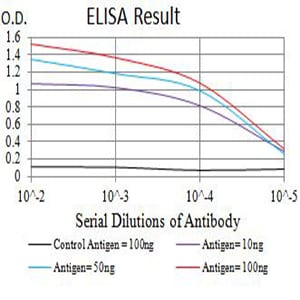
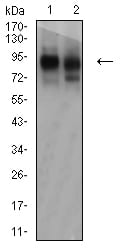
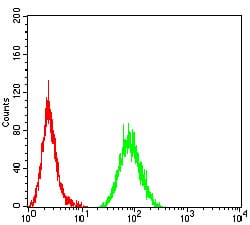
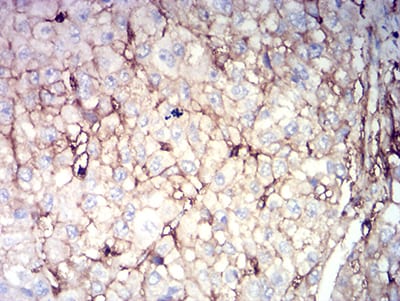
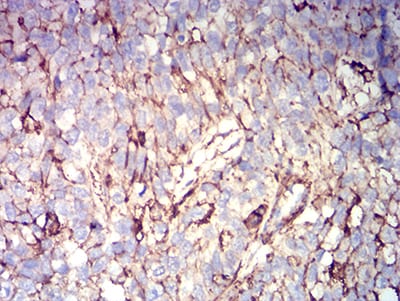
| WB | 1/500 - 1/2000 | Human,Mouse,Rat |
| IF | 咨询技术 | Human,Mouse,Rat |
| IHC | 1/200 - 1/1000 | Human,Mouse,Rat |
| ICC | 技术咨询 | Human,Mouse,Rat |
| FCM | 1/200 - 1/400 | Human,Mouse,Rat |
| Elisa | 1/10000 | Human,Mouse,Rat |
| Aliases | IN; LHR; MC56; MDU2; MDU3; MIC4; Pgp1; CDW44; CSPG8; HCELL; HUTCH-I; ECMR-III |
| Entrez GeneID | 960 |
| clone | 7F4F12 |
| WB Predicted band size | 81.5kDa |
| Host/Isotype | Mouse IgG1 |
| Antibody Type | Primary antibody |
| Storage | Store at 4°C short term. Aliquot and store at -20°C long term. Avoid freeze/thaw cycles. |
| Species Reactivity | Human |
| Immunogen | Purified recombinant fragment of human CD44 (AA: extra 36-194) expressed in E. Coli. |
| Formulation | Purified antibody in PBS with 0.05% sodium azide |
+ +
以下是3篇关于CD44抗体的经典文献摘要信息,涵盖其在不同领域的研究应用:
---
1. **文献名称**:CD44: From adhesion molecules to signalling regulators
**作者**:Ponta H, et al.
**摘要**:该综述系统总结了CD44作为细胞表面黏附分子在肿瘤转移、干细胞维持及免疫调节中的作用,重点讨论了CD44抗体通过阻断配体结合抑制肿瘤细胞迁移的机制,并强调其在靶向治疗中的潜在价值。
2. **文献名称**:Prospective identification of tumorigenic breast cancer cells using CD44+/CD24− markers
**作者**:Al-Hajj M, et al.
**摘要**:研究团队利用CD44抗体(结合CD24抗体)成功分离出乳腺癌干细胞亚群(CD44+/CD24−),证明该群体具有强致瘤性和化疗耐药性,为靶向CD44的肿瘤治疗策略提供了实验依据。
3. **文献名称**:Anti-CD44 antibody treatment lowers hyperglycemia and improves insulin resistance in obese diabetic mice
**作者**:Kawakami T, et al.
**摘要**:通过CD44中和抗体干预肥胖糖尿病小鼠模型,发现其可抑制脂肪组织炎症反应并改善胰岛素敏感性,揭示了CD44抗体在代谢性疾病治疗中的新应用场景。
---
如需具体DOI或发表年份,可进一步补充说明。
CD44 is a transmembrane glycoprotein that serves as a cell-surface receptor for hyaluronic acid (HA) and other extracellular matrix components. It plays a critical role in cell adhesion, migration, signaling, and interactions with the microenvironment. Expressed in various cell types, including lymphocytes, stem cells, and cancer cells, CD44 is involved in physiological processes like immune response, wound healing, and tissue homeostasis. Its splice variants (e.g., CD44 standard [CD44s] and variant isoforms [CD44v]) contribute to functional diversity, with CD44v often linked to cancer progression and metastasis.
CD44 antibodies are essential tools for studying its expression, structure, and function. They detect specific epitopes on CD44 isoforms, enabling research into its role in diseases, particularly cancer, where CD44 overexpression correlates with tumor aggressiveness, stemness, and therapy resistance. In cancer research, CD44 is a marker for cancer stem cells (CSCs), making it a potential therapeutic target. Antibodies are used in techniques like flow cytometry, immunohistochemistry, and Western blot to assess CD44 levels in tissues or cells.
Therapeutic CD44-targeting antibodies are under investigation to block HA binding or induce antibody-dependent cytotoxicity against CD44-rich cancer cells. Challenges include ensuring isoform specificity and understanding context-dependent roles, as CD44 can exhibit both tumor-promoting and suppressive effects. Overall, CD44 antibodies remain pivotal in unraveling its biological complexity and translational potential.
×